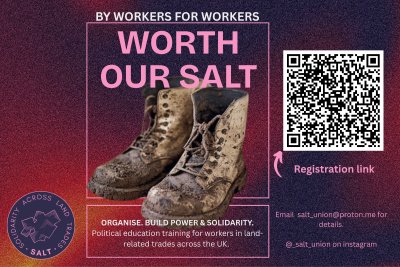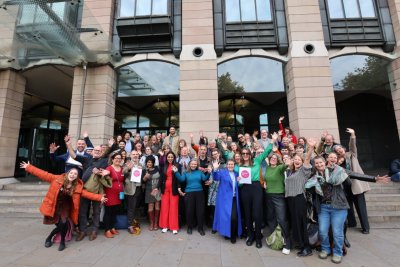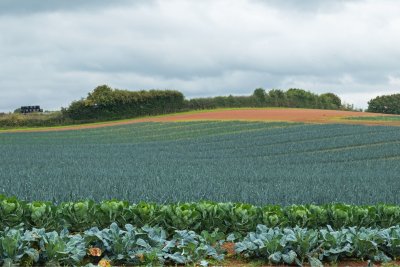

Let's keep food sector pay ratios within fair limits
In the food industry, top bosses can sometimes be paid over a hundred times more than the workers who grow or make our food. This embeds inequalities and means that many of those who provide our sustenance cannot afford to eat well themselves - a bitter irony. To provoke a healthier conversation about money, Sustain has undertaken its own Pay Ratio Analysis and put in place checks and balances to avoid disparities widening in future, writes Sustain Chief Executive Kath Dalmeny.
Over recent years, Sustain has become increasingly interested in the role that organisations and businesses can play in tackling poverty and inequalities – principally relating to food and health, whilst also recognising that these are part of wider poverty, fair pay and inequalities agendas. Addressing such issues is manifest in many of Sustain's projects and campaigns, as well as in our emerging thinking on structural and legal approaches to improving everyone’s opportunity to enjoy good food, health and well-being. We feel at Sustain that it is therefore encumbent on us to ‘walk our talk’ on tackling inequalities through fair pay.
Hence, as a matter of course, Sustain now renews our annual commitment and licence to declare ourselves a registered London Living Wage Employer; as have our landlords Ethical Property Company so that cleaning and ancillary staff are included. This means that the people we employ, or who are employed to provide us with routine services, are paid at least either the Living Wage (nationally) or London Living Wage (in the capital) as calculated by the Living Wage Foundation.
However, looking at the wider food sector, we have been very concerned to learn that differences in income between the highest and lowest paid can be routinely over a hundred times greater for chief executives than for their lowest paid employees - even greater when hidden remuneration is taken into account such as vast expense accounts and fees paid for top bosses sitting on each other's remuneration committees. We feel that transparency of such disparities would help provoke a national conversation about the root causes of hunger, household food insecurity, inequalities in ill health, and why people on a low income are more likely to get sick earlier in their lives, and die younger, than those on a higher income.
In 2018, Sustain’s Council of Trustees agreed that Sustain's Annual Report should in future contain a Sustain Pay Ratio Analysis, benchmarked against the 1:8 ratio championed by the international WageMark Foundation standard, and checked by Sustain's Auditor.
In the first analysis undertaken in 2018 and published in December 2018, Sustain’s Pay Ratio is calculated as 2:1 when comparing our highest staff salary to our lowest staff salary; and 3:1 when comparing our highest staff salary to the London Living Wage, which is the rate paid to the people who clean and service Sustain's office.
This is well within the benchmark of 8:1 considered to be good practice by the international WageMark Foundation, and the UK third-sector average of 10:1. It is also less than the average for local authorities at 15:1, and very considerably less than the ratio typical in large commercial companies, such as those in the FTSE 100, at 130:1.
Sustain has every intention of keeping our ratio well below 8:1 (it is not an upper target) and will publish transparently our calculation and benchmark each year. We consider this to be an important check and balance against widening pay disparities and inequalities; an opportunity for Sustain to 'walk our talk'; and provocation of a bigger conversation about fair pay. We have published our methdology below and warmly encourage others to apply this within their own organisations.
Further, we encourage organisations to ask their lowest paid workers, and the lowest paid in their supply chains - experts by experience - how they are managing and whether their low income has caused difficulties in keeping themselves and their families warm, housed and well fed. Knowledge and analysis can help to bring voices and experiences to the fore that have too long been silent.
- Download the pay ratio briefing paper commissioned by Sustain in 2017 from specialist researcher Dr Lindy Sharpe
- Download Sustain's pay ratio methodology adopted by Sustain in 2018, or read it below
Pay Ratio: Sustain's methodology
Sustain commissioned social justice researcher Dr Lindy Sharpe to propose a way for Sustain to calculate our pay ratio. This paper sets out Sustain’s policy, approach and methodology. Sustain is also a registered Living Wage employer and operates a fair and transparent fixed salary scale.
1. Sustain’s approach to pay ratio analysis
Sustain and many of our members and colleagues have worked for many years to improve social equality, reduce diet-related disease and health inequalities, and help people living on a low income to be able to access and enjoy fresh, healthy and affordable food. Over recent years, we and our colleagues in the food poverty movement have increasingly recognised that the inability to afford a good diet can be severely limited by other factors, such as household income, food prices, utility and housing costs and other personal circumstances. Sustain has therefore increasingly recognised such factors in our campaigning and advocacy work. We welcomed, for example, introduction of a national minimum wage (the so-called ‘national living wage’) and are ourselves a registered Living Wage Employer (paying at or above the cost of living, as calculated by the Living Wage Foundation).
Hunger in modern Britain is shocking enough. However, recent data shows that even when people are in work, they are often unable to feed their families due to low and precarious incomes and rising costs of other essential items such as rent and utility bills. Many people referred to charitable food banks in recent years have been people in paid work. Meanwhile, the gap between the highest and lowest paid has widened incongruously.
Sustain, our staff and trustees, feel that it is important that we ‘walk our talk’. There is a gap between the lowest and highest paid in our organisation, in recognition of responsibilities and experience, but we want to make sure that this is kept within sensible limits. And we don’t want to forget the people who work hard to make our activities possible, such as freelancers, receptionists and cleaners. All deserve fair pay and to be able to live and eat well.
Taking all this into consideration, Sustain has therefore adopted the following Pay Ratio Policy. We will:
- Publish Sustain’s methodology for calculating our pay ratio
- Undertake our analysis on the basis of comparing:
- Top salary to the bottom salary in Sustain’s fixed salary scale
- Top salary to London Living Wage - the rate paid to workers providing essential services but not directly employed by Sustain, such as the people who clean our office
- Ask our auditors to check our figures and our Pay Ratio Statement for our Annual Report
- Promote this approach and methodology to Sustain members and the businesses and local and national institutions that we work with
- Integrate this analysis routinely into our annual monitoring and reporting
- Use the Wagemark 8:1 pay ratio as a benchmark within which Sustain should stay - but stay well below this and never treat this as an upper target
NB: We have chosen not to compare the top salary to the median salary, as for some industry pay ratio declarations. We believe this can be misleading and can divert attention from entrenched low wages at the bottom end of the scale.
2. Typical third-sector organisation pay ratios
Sustain’s first pay ratio calculation in 2018 shows that our pay ratio is between 2:1 and 3:1, well below the third-sector average. Of note, most non-governmental organisations have relatively narrow pay ratios in comparison to local authorities and large companies. Additionally, Sustain has no hidden bonuses, hidden remuneration or expense accounts that might boost incomes and disparities through indirect means – a practice we understand to be common in large companies.
Table 1: Ratios of top pay to ‘bottom’ pay:
| FTSE 100 companies | 130:1 |
| Local authorities | 15:1 |
| Charities with income over £50m | 10:1 |
3. Sustain’s pay ratio methodology: the details
Using actual figures for the year prior to the pay ratio calculation, and based on hourly rates or the hourly rate equivalent of our salaries, Sustain calculates our pay ratio based on comparing:
- Sustain's highest staff salary to our lowest staff salary
- Sustain's highest staff salary to the London Living Wage, which is the rate paid by our landlord the Ethical Property Company to the people who clean and service Sustain's office
In line with advice and the methodologies used by other organisations undertaking pay ratio analysis:
- Ratios should include only UK-based staff (noting that Sustain does not employ overseas staff)
- Expenses-only volunteers are not included in the calculation
It should be emphasised that there is not a one-size-fits-all approach, and Sustain, like many organisations, will have its idiosyncrasies, year to year. The key thing is for the published ratios to be based on a robust, transparent and consistent method: with the methodology published with the ratio.
The policy and methodology were approved by the Sustain Council of Trustees, May 2018; and the analysis published as part of Sustain's annual report and accounts in December 2018.
Developed with reference to:
- High Pay Centre (2014) FTSE 100 bosses now paid an average 130 times as much as their staff.
- Hutton Review (2011) Fair Pay in the Public Sector.
- High Pay Centre 2015, Pay ratios: Just Do It, report by Paul Marsland.
- Wagemark 2017, About the Wagemark standard: www.wagemark.org/about/
- The Working Group on Executive Remuneration 2016, Final Report
Food Poverty: Championing people-powered projects that tackle the root causes of food poverty.
Sustain
The Green House
244-254 Cambridge Heath Road
London E2 9DA
020 3559 6777
sustain@sustainweb.org
Sustain advocates food and agriculture policies and practices that enhance the health and welfare of people and animals, improve the working and living environment, promote equity and enrich society and culture.
© Sustain 2026
Registered charity (no. 1018643)
Data privacy & cookies
Icons by Icons8







